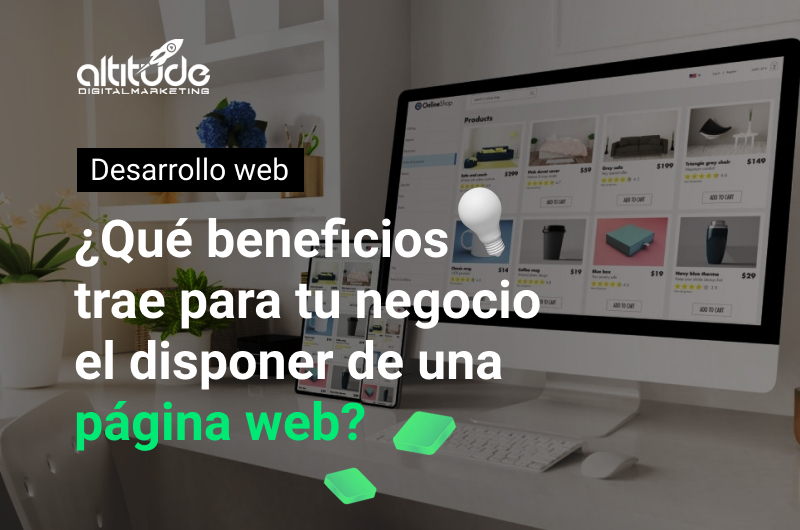In today’s world, it’s hard to imagine businesses that don’t have an online presence, as for many, this means they don’t exist.
Having a website is crucial because it helps keep your clients informed about what’s happening with your brand. It also acts as a differentiation tool against your competitors, especially in today’s increasingly globalized market. Being current and effective with your content will help you stand out from the rest.
Are Social Media Enough?
First, it’s important to understand the differences between the benefits of social media vs. websites. Here are a few differences to consider:
- Websites are a way to attract potential customers, generate visits, increase traffic, and close sales. On the other hand, social media is more about building a community, interacting with your audience, and providing value to users.
- With a website, you can track your results by analyzing how users find you and the level of traffic you receive. On social media, you typically need other tools to measure this.
- With the correct use of keywords and search terms, you can attract prospects and leads quickly. On social media, building a community takes more time.
- The return on investment is more obvious on a website, as you might have few visits but many purchases and revenue. On social media, you might have a million users in your community, but no sales.
These are some of the differences between both communication formats, and it’s clear that websites offer specific advantages over social media.
What Specific Benefits Does a Website Offer?
This will depend on how you want to direct your website, so let’s review the different areas a website can help you with and how to take advantage of them.
Benefits of a Website as a Portfolio
- Professional Credibility: Everyone has access to the internet, no matter where they are in the world. Having your professional information, the projects you’ve completed, and the merits you’ve achieved will help when presenting your promotional experience.
- Exposure of Work and Projects: As mentioned earlier, showcasing your work online is a great way to be accessible to everyone and have a reference when presenting your work.
- Give More Detailed Access to Your Professional Profile: A digital portfolio allows clients to find you without you needing to search for them. They will have access to your profile and your work, though you should still promote your profile.
- Blog Integration: If you want to showcase your expertise in a specific field, blogs are a great way to highlight your knowledge.
Benefits of an Educational Website
- Saves Time in Planning and Organization: An educational platform allows you to store all necessary resources for students in one place, saving valuable time for both teachers and learners.
- Improves Student Engagement: Students can engage more effectively on these platforms, where their questions can be answered by teachers, increasing collaboration and feedback.
- Optimizes Teacher Tasks: Teachers can save time and material by using tools available on the platform that help track student performance.
- Improves Accessibility: Educational websites allow students to send questions, making the teacher’s work accessible to all students, not just some.
Benefits of a Website for Your Business
- Digital Presence: A website allows users to be closer to you in the digital world and helps establish your personality across social platforms.
- Credibility in Search Engines: Potential buyers will judge the credibility of your business based on the first impression they get from your website. Having contact details, business address, and other data builds trust with potential clients.
- Showcase and Represent Your Business: A website is the perfect place to capture potential clients since it’s the first impression they’ll get of your business. It adds prestige and quality to your brand.
- Customer Service: With a website, you can stay in constant communication with your customers, who can ask about your products or services at any time, providing them with trust and security.
- Information and Positioning: The majority of searches occur on the internet. However, you need to ensure that your website is in the top search results, which requires a good SEO strategy.
- Saves Time: A website reduces the frequency of recurring questions by creating a FAQ section, thus answering common inquiries and saving time.
- Cost-Effective: Compared to other mediums, a website is a cost-effective investment.
- Wider Audience Reach: A website allows you to reach users outside of your country or continent and also helps retain current users through special offers.
- Increased Sales: A website allows users to view your products, leading to higher trust, which can significantly boost your sales.
Conclusion
Having a website offers numerous benefits that differ from what you can achieve with social media alone. These benefits range from the wealth of information you provide to users, the credibility it lends to your brand, the opportunity for growth in sales, and the accessibility and availability it provides to potential customers for reviewing your content.
There are many ways you can take advantage of a website, whether you’re a brand promoting your products or services, an educational entity looking to digitize your curriculum, a professional seeking to showcase your work in a portfolio, or many other uses you can implement.

